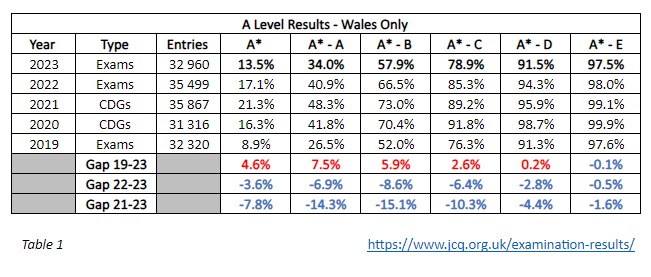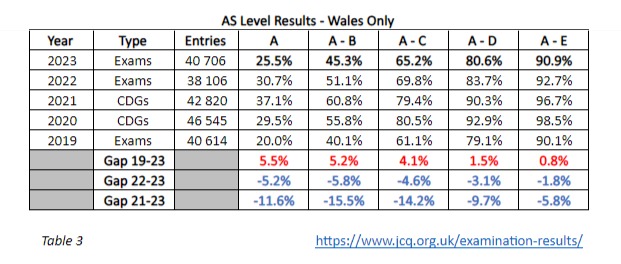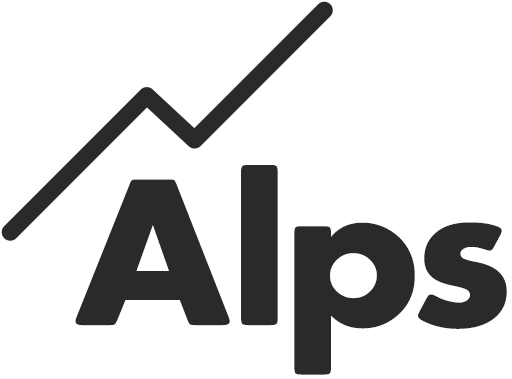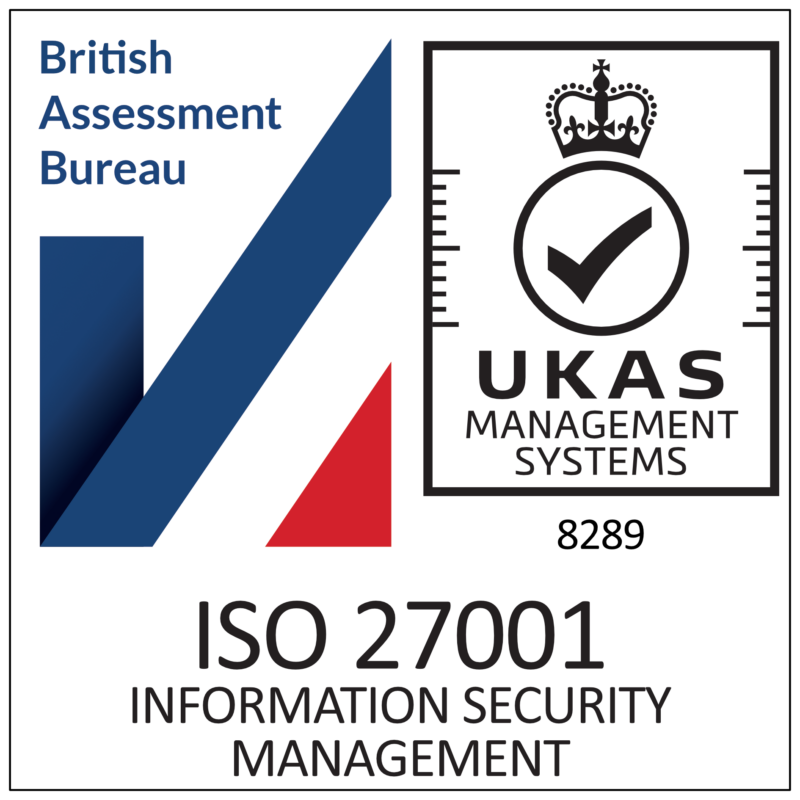Hitting the ground running in September 2023 – Setting priorities for Y13 as a Post-16 Leader in Cymru / Wales
By John Philip, Alps Senior Education Consultant
If you are a senior leader in a school or college, you will be urgently reviewing your 2023 examination results. Now that the Autumn Term is underway, here are some reflections from Alps on setting Post-16 priorities for Year 13 students.
Understand your context: A Level raw attainment.
This year in Wales the A Level results were brought back to close to halfway between the results outcomes in 2019 and 2022, to transition back towards pre-pandemic standards. Table 1 shows the high-level changes in results performance for A levels over the past 4 covid-impacted years.
Understanding this context is vital when looking at your results this year.

We were told, and all anticipated, that our results would be lower this year compared to last, and this has happened. We can also see in Table 1 that the falls from 2022 were most significant at A*-C upwards.
Across the UK there were also variations. Grades were lower in Wales than in Northern Ireland, where results were also set midway between the 2019 and 2022 outcomes. However, results in Wales were significantly higher than in England, especially at A*-B+, as results in England were brought back close to 2019 levels. Table 2 shows the comparative results:

The fall at A*-A% was steepest in England where 26.5% of exams achieved the top grades, compared to 34% in Wales and 37.5% in Northern Ireland.
Understand your context: AS Level raw attainment
As with A levels, in Wales the AS results were brought back to close to midway between the outcomes in 2019 and 2022. Table 3 shows the high-level changes in AS level results performance over the past 4 covid-impacted years.

So, how does your own school or college’s A level and AS level performance compare with these figures?
Understand your context: Value-added
Value-added systems measure progress against a standardised starting point. For A and AS level outcomes, the starting point for the most popular progress tracking systems is an average GCSE score. Measuring progress is a fairer and more aspirational view of performance than reviewing raw attainment alone. By looking at a value-added analysis of results, you can see how students with the same starting score compare in their outcomes, both by student and by subject, against set benchmarks.
The benchmarks
During ‘normal’ times, Alps uses the full national DfE dataset to create benchmarks against which schools and colleges can compare their performance. The DfE has not released data on which to create benchmarks since 2019, due to covid, so the latest National Benchmark is from 2019.
This year, as we did last year, Alps is offering an additional current client-based benchmark against which to evaluate your value-added performance. Alps users can simply choose in the Alps Connect platform which benchmark you want to view your results against, the 2019 DfE benchmarks or the 2023 Alps client benchmarks.
The practical implications of which benchmark to use
On results day your results were set against our 2019 benchmark based on 2019 DfE data and 2019 Welsh client data. Alps chose this as the most appropriate benchmark because results were being transitioned midway between 2022 and 2019 standards. However, for two reasons this 2019 benchmark is imperfect:
- Students in the 2023 cohort achieved GCSEs through CDGs not exams, this meant that most schools and colleges had higher average Prior Attainment (PA) for students than they would have had for similar ability students in 2019. This meant that more students were in high PA bands than in a ‘normal’ year.
- The results in Wales were set higher than the results in 2019, midway between 2019 and 2022. This means that schools and colleges may have higher results than they obtained in 2019, to balance their higher average GCSE scores.
In September Alps is releasing an alternative Welsh client benchmark based on 2023 client results’ data from our Welsh schools and colleges. From this date, you can choose in the Connect platform whether to use the 2019 DfE benchmark or the Alps client benchmark, when analysing your data.
So, the new questions for leaders this year are: How did your school or college perform against these two benchmarks, and which one are you using to review performance and establish priorities for the coming year?
Key questions and suggestions for this time of year:
When asked by colleagues in schools and colleges, I recommend that you set priorities based on your school or college’s performance in 2023.
Key questions should include:
- What strategic priorities emerge from your raw results?
- What strategic priorities emerge from your (2023 benchmark) value-added? For example, in your Alps analysis you will be able to see trends over time, has a subject performed worse or better over time than expected? Are there any big subjects causing concern? Are there any poor performing small subjects that need to be discontinued?
- Was the performance of any significant student group concerning? For example, by prior attainment, by gender or ethnic group.
- Which subjects performed best and least well in 2023?
- Which subjects predicted final grades most or least accurately in 2023?
- Which subjects had inconsistent performance at teaching set level?
Using the answers to these questions, the next big question emerges: What are you doing right now, as a result of your analysis, to try to consolidate strengths and eradicate weaknesses in 2024?
Setting priorities based on your new Y13’s end of Y12 data
Your new Y13 cohort, who achieved average GCSE scores via higher-than-normal GCSE results in 2022, are very likely to have a higher average GCSE score than is typical for your school or college pre-covid. When working with schools, key questions I would be asking include:
- What strategic ‘data’ priorities had already emerged before the end of the Summer Term?
- What priorities relating to attendance or attitude to learning or mental health etc were a significant issue during Y12?
- What strategic priorities emerged from this cohort’s AS results?
Y13 – My 8 Top Tips at this time of year
The academic year often begins with in-depth evaluation of results in Raising Standards meetings with subject leads. Perhaps in September 2023 these meetings need a focus on current Y13, where they appear to be based on Y12 assessment, and how best to move forwards effectively.
Top Tip 1: As some students may have either left school or college in the summer, or dropped or switched a subject for Y13 or gone back to Y12, at Alps we suggest uploading a Monitoring Point Zero (MPZ) at the start of Y13. Essentially this is AS results data but edited to only include students now in Y13 and only showing grades in subjects they are continuing to study in Y13. Sets / teachers should also be adjusted so teachers can see their Y13 set’s baseline based on AS performance. It is useful to evaluate which AS subjects retained comparatively low percentages of students into Y13 for A Level in September 2023. What issues does this reveal?
Top Tip 2: As always, there is much that we do not yet know and will have little ability to control.
I recommend that you prioritise those things you can control, such as the quality of teaching and learning, the quality of guidance and support, and the quality of your leadership at all levels.
Top Tip 3: Create a realistic assessment timetable with subject leads to enable students to practice and master the skills required in examinations.
Top Tip 4: Take decisions now about AS re-sits. Can students who are targeting improving AS marks be additionally accommodated in Y12 lessons?
Top Tip 5: Use Alps Connect (or your alternative system) effectively throughout the year to help identify subjects, sets, student groups and students for support (& praise). Note for Alps users, if your skill at using the platform is rusty or you want more practical detail, we have a lot of support. Visit our Knowledge Base for our new Explorer series, a set of mini-videos on using Alps to best effect, and join our Champions Webinar programme, where I, or another of our educational experts, look at the pressing focus for each term, the key questions, latest updates and suggestions on how to use Alps to support you. You can also book in a free health check or you can always call the office to speak to one of the team about additional support we can offer.
Top Tip 6: I recommend a sharp focus on the subjects that are taken by larger cohorts of students, as these subjects will have the most significant impact on this cohort’s outcomes, their destinations and your value-added.
Top Tip 7: Do all you can to be relentlessly positive both with your students and their teachers – at the start of the year and throughout.
Top Tip 8: Your top priority must involve putting the students’ needs and interests first, aiming for each to reach their potential and, perhaps crucially, to achieve positive post-18 pathways (again, for Alps users, check out our Champions resources on our Knowledge Base for practical ways to use Alps to help to do this).
Tracking Y13 in Connect during 2023-24
During 2023-24 Alps will continue to offer the 2019 data set for you to track progress against as Qualifications Wales now intends for all results to return to pre-pandemic standards in 2024.
You will also have the option to use the Alps 2023 Welsh Client data set for tracking and monitoring, however, remember that the Welsh benchmark will be based on transitional 2023 results that are likely to be difficult to match in 2024.
Ultimately, it will be up to each school or college to select the benchmark you feel is most appropriate for you. Although results seem likely to be returned to 2019 standards in 2024, the new Y13 students in 2023-24 will typically have higher than normal transitional GCSE results than they were awarded in 2022 to consider.
Rest assured, after Results Day in 2024 we will analyse client data as early as possible to make analysis based on the actual 2024 results available to our schools and colleges in Wales.
About the author:
 Since 2010, John Philip has worked with over 500 schools as an Alps Senior Educational consultant and, as a PiXL associate, with the Leadership teams of 27 PiXL schools at KS4 and Post-16, having previously focused on performance improvement and ‘hitting the ground running’ at the start of each academic year at Little Heath School.
Since 2010, John Philip has worked with over 500 schools as an Alps Senior Educational consultant and, as a PiXL associate, with the Leadership teams of 27 PiXL schools at KS4 and Post-16, having previously focused on performance improvement and ‘hitting the ground running’ at the start of each academic year at Little Heath School.
This blog is a companion piece to our Alps webinar ‘Hitting the Ground Running: KS5 Wales which goes out live at 3:30pm on Tuesday 3rd October. This webinar will demonstrate how to use Alps Connect most effectively when tracking progress.
For Alps users – to register go to your Connect Homepage and click on “Book your Webinar space” for a full list of our free Champions Webinars.
If you are not an Alps user and would like more information about how we can support you, please contact us at [email protected] to speak to one of our friendly team.
Need more information?
If you would like any further information, please contact one of our expert advisers.


